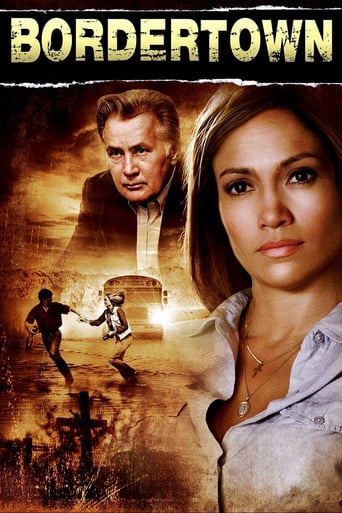

A different way of telling a story
... View MoreA film with more than the usual spoiler issues. Talking about it in any detail feels akin to handing you a gift-wrapped present and saying, "I hope you like it -- It's a thriller about a diabolical secret experiment."
... View MoreA great movie, one of the best of this year. There was a bit of confusion at one point in the plot, but nothing serious.
... View MoreThe thing I enjoyed most about the film is the fact that it doesn't shy away from being a super-sized-cliche;
... View MoreFirst of all, the intentions of the filmmakers were seem to be worthwhile and good--to expose the sordid work conditions under which American corporations operate at the Mexican Border and which often spawn the mistreatment of the women workers following a day's or night's work. I suspect that both Jennifer Lopez and Antonio signed onto the project because of the credentials of established Latin filmmaker Gregory Nava, who has a keen eye for capturing the look and feel of a place, in this case, Ciudad Juarez. The problems, however, arise in the mixing of a documentary-style expose with the casting of a glamorous star who, not unlike Joan Crawford in her heyday, looks a little too smart and elegant for her scripted surroundings, local folks unlikely to look upon this icon (which is exactly what she appears to be) as just another local. And about half the way into this detailed examination of a mistreated worker, the film shifts into Hollywood melodrama, some unlikely over-the-top drama. I did not find it dull, but was disappointed it didn't fulfill it's best promise
... View More"It isn't free trade; it's slave trade; it's a ... scam", yells investigative reporter Lauren Adrian (Jennifer Lopez), to her newspaper boss George Morgan (Martin Sheen). They're arguing about the North American Free Trade Agreement (NAFTA), the villain in this film about the injustices of NAFTA border factories toward their women workers, and in particular about the border town of Juarez, on the Rio Grande, across from El Paso, Texas.The script's characters and plot are fictional. But they are set against a backdrop of a real-life situation that has been going on for years. Poorly paid young Mexican women are raped and killed in these NAFTA border towns. Nobody really cares, least of all the cold corporations that employ the women.In "Bordertown", George Morgan sends Lauren to Juarez to get a story. She does. But what she finds is that the real killers are more powerful and shadowy than she imagined. It's a situation not unlike what Karen Silkwood faced when she tried to investigate a nuclear plant.The film is thus highly political. Its message overpowers the story. Most viewers will sympathize with the message. But what about the story? The characters are not entirely believable. For example, the young Mexican woman whom Lauren befriends can't seem to speak English when they first meet. And Lauren says she can't speak Spanish. Yet later, the young woman and Lauren chat up a storm both in English and Spanish, a dialogue necessity, no doubt, to placate viewers. The plot's climax is Hollywood sensationalized, which detracts from the authenticity of the message.Color cinematography is very high contrast, which works well, given the good vs. evil theme. Prod design and costumes are quite realistic. The filming in Mexico gives credibility to the story, though filming entirely in Juarez was not possible owing to the physical danger. Acting is acceptable. Lopez does a fine job.My impression is that "Bordertown" was not given a proper theatrical release here in the U.S. because of its tough political message, which speaks volumes, if true. But despite some imperfections in its script, the film deserves to be seen by viewers, and specifically because of that potent underlying message.
... View MoreThis is not the kind of movie I usually see, and I must admit that while watching it on TV, I gradually realized that it was not the documentary film I expected. The story is based on a horrifying and tragic reality of raping and killing of women on the Mexican border, of which I did not know anything, as underreported throughout the world. The movie has so the laudable merit of bringing to light and denouncing the terrifying drama of thousands of women being raped and disappeared in those waste lands, working in those appalling "maquilladoras", where even the most basic human rights are completely disregarded, and where deep economic interests prevail over respect for human dignity. However, as the story progressed, I realized it was more an action-thriller than a documentary picture, standing out for gripping though improbable, twists, a tense and quick pace, intertwined with some more relaxed and relaxing moments, which appear as really improbable and above all of bad taste and out of place if we consider the grave topic of the movie. It is as if that worthy aim gives way to more entertaining and market needs. So my doubt was: how can such a highly committed movie be bent to the logic of the box-office? How can you shift your attention from scenes of rape of terrifying violence to the underlining of J. Lo's perfect silhouette? It is evident that the production aimed at attracting audience through an attractive cast and some shrewd devices, such as pacing action, a thriller-plot, sentimental flash-backs, some entertaining music, thus losing its seriousness and credibility. I watched it till the end, because it was gripping and, like all thriller movies, you want to know how it ends up, but I realize this is not the reason why I should have wanted to see it till the end, and in this sense I think it is, in the end, a failed movie.
... View MoreAll these young women are being murdered in and around Juarez. Nobody knows who's doing it or why. (True enough, though not often noted in the American press.) The editor of a Chicago newspaper (Martin Sheen) sends an ambitious reporter (Jennifer Lopez) to Juarez to investigate the events and report back to him. In Juarez, Lopez hooks up with an ex-lover (Antonio Banderas) who now runs the fictional newspaper Sol de Juarez. His is the only local paper taking the wave of murders seriously, the others treating them as minor incidents, perhaps the result of domestic violence. This is also the view of the police, who don't want to stir up any local muck. So Lopez and Banderas run into obstacles all along the way, even when they take under their wing a young woman who has almost miraculously survived an attack.The movie suggests that the real culprits here are the American-funded factories that were built in the border towns after the passage of NAFTA. The girls who work in these sweat shops, the maquiladoras, are not worth protecting -- not at four dollars a day -- and so are expendable because there are always more lining up for the jobs.This is a simple-minded explanation of a revolting, complicated, tragic and fascinating social problem. Some men, somewhere, have learned that it is easy to rape and murder a young woman around Juarez, bury her body in the desert, and walk away from it. And the movie slips us a formula, like an an easily swallowed pill, along the lines of "B is a function of A." Plot aside, the development of events is confusing. I lost track of the identity of some of the characters and their motives. The movie never sinks to the obvious level of a stereotypical slasher film, though. It's ambition prevents it, and presumably the writer and director's taste. The action scenes are handled fairly well.The photography is a distraction. It's in high contrast, such that if, in a sunlit room, a figure moves into the shadows, it disappears into the blackness while the rest of the environment remains an eye-numbing glare. And the images are in saturated yellow, seeming to overheat all the surfaces and turn them grimy and even more squalid than they already are. At night, they are blue but the same effect is achieved.There's nothing wrong at all with the performances. Jennifer Lopez is no longer the sex bomb of yesteryear but she's acquired more character as an actress, still has that enduring mandible and cantilevered rear end. Antonio Banderas, I like. The guy isn't exactly handsome but has a face and demeanor that are at once masculine and sympatico. Martin Sheen may be a little weak, or perhaps it's his formulaic lines being shouted over the roar of giant newspaper printers. ("Incredible humanity.") I wish this well-intentioned film had been better than it is. I think it's a mistake to simplify complex social problems into a conflict between a good side and a simple, single bad side. But that generates an even more disturbing thought. Suppose the film makers were right to boil this anfractuous story down into its bundle of two oppositions? Suppose the average viewer is unable any longer to grasp the multivaried aspects of a wave of unrelated murders of young women? Or -- well, not UNABLE to grasp complexity, just unwilling to put out the effort to do so? How much easier to pick a villain and stick to it. How much more appealing to an impatient public. How much more commercial. Even if genuine ambiguity must be thrown out the window.
... View More